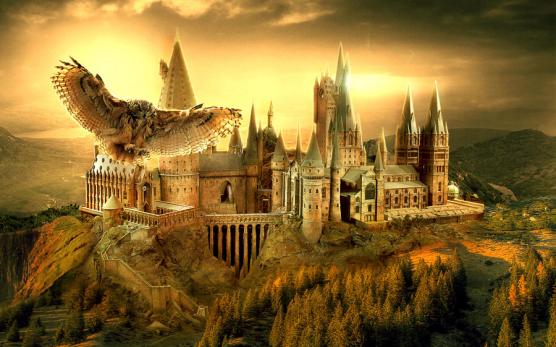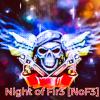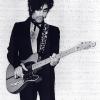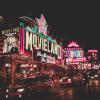Dear JK Rowling,
I am unabashedly a huge Harry Potter fan. I first encountered Harry when I was in Junior High, volunteering at the public library (nerd status, I know). The children’s librarian handed me book 1, and I was hooked. I even used to frequent Harry Potter message boards back in the day with my friend Kathleen (we were “Parvati” and “Lavender” cause we also shared an interest in divination, ha). Anyway, all this is to say, Harry holds a sacred spot in my heart. But I’m not one of those fans who can recite things verbatim, or remember every tiny detail, so if I’m missing something, I hope one of those fans will help me out.
I’ve been interestedly following the news that there is a new Harry Potter prequel-of-sorts in the works, for “Fantastic Beasts and Where to Find Them,” following “magizoologist” Newt Scamander. I hadn’t been following it closely, but a few days ago, I saw your exchanges on Twitter about the name/location of the American Wizarding School–and I started to get a bit concerned.
So, here are the things that make me a little uncomfortable. But first, I smiled when you referred to the name of the American school as “immigrant origin”–rather than saying something like “American” or “normal” or something else that normalizes settler language and naming on our lands–10 decolonizing points for Gryffindor! Bonus points for using the term “indigenous” and for realizing not only are there many, many tribes, but that they are tied to place and specific location. Much more effort than most folks, even here in the US.
But I’m nervous about “Indigenous magic” and specific tribes being associated with the wizarding school. Part of the pure joy of Hogwarts is that it is completely and totally imaginary. The wizarding world you created for us through Hogwarts is nothing short of incredible, and allows us as readers to be immersed in a world and history and peoples completely outside our own. Hogwarts has roots in the British schooling system, yes, but there aren’t any strong references to actual traditions from the lands Hogwarts occupies (like Druid or Celtic “magic”).
(ETA (6/9): I stand corrected. Apparently there are all kinds of references to Celtic/Druid/other local traditions–which actually lends credence to my points. As an American kid with no frame of reference, these traditions with actual histories, cultures, and backstories, became “completely imaginary.” Can you imagine if the reverse becomes true? If an international audience is exposed to Native traditions without any basis for understanding, and therefore absorbs them into a fantasy wizarding world? Especially since our struggles and oppression is not something of the past…)
The problem, Jo (can I call you Jo? I hope so), is that we as Indigenous peoples are constantly situated as fantasy creatures. Think about Peter Pan, where Neverland has mermaids, pirates…and Indians. Or on Halloween, children dress up as monsters, zombies, princesses, disney characters…and Indians. Beyond the positioning as “not real,” there is also a pervasive and problematic narrative wherein Native peoples are always “mystical” and “magical” and “spiritual”–able to talk to animals, conjure spirits, perform magic, heal with “medicine” and destroy with “curses.” Think about Grandmother Willow in Pocahontas, or Tonto talking to his bird and horse in The Lone Ranger, or the wolfpack in Twilight…or any other number of examples.
But we’re not magical creatures, we’re contemporary peoples who are still here, and still practice our spiritual traditions, traditions that are not akin to a completely imaginary wizarding world (as badass as that wizarding world is). In a fact I quote often on this blog, it wasn’t until 1978 that we as Native peoples were even legally allowed to practice our religious beliefs or possess sacred objects like eagle feathers. Up until that point, there was a coordinated effort through assimilation policies, missionary systems, and cultural genocide to stamp out these traditions, and with them, our existence as Indigenous peoples. We’ve fought and worked incredibly hard to maintain these practices and pass them on.
So I get worried thinking about the message it sends to have “indigenous magic” suddenly be associated with the Harry Potter brand and world. Because the other piece I deal with on this blog is the constant commodification of our spiritual practices too. There is an entire industry of plastic shamans selling ceremonies, or places like Urban Outfitters selling “smudge kits” and fake eagle feathers. As someone who owns a genuine time-turner, I know that marketing around Harry Potter is a billion dollar enterprise, and so I get nervous thinking about the marketing piece. American fans are going to be super stoked at the existence of a wizarding school on this side of the pond, and I’m sure will want to snatch up anything related to it–which I really hope doesn’t include Native-inspired anything.
I know at this point my concerns are complete speculation drawn off a few tweets, and so I hope these are things you’ve thought through as well. We just have so few representations of Native peoples or cultures in popular culture, and the representations that we do have are largely negative or stereotypical. We will be undoing the damage of the Twilight wolfpack and Tonto for years to come, and those audiences pale in comparison to the international appeal of Harry Potter. So Jo, I just hope you can remember that Indigenous peoples are real, and the choices you make around the American Wizarding School, as ridiculous as it seems, will have real implications and impact on our continued struggles for recognition, decolonization, sovereignty, and justice.
Wado (thank you),
Adrienne
Original Source: http://nativeappropriations.com/2015/06/dear-jk-rowling-im-concerned-abo...
















